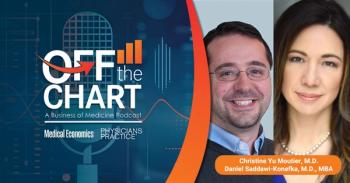
A Vital Lesson, Down the Drain
A biopsy sample down the drain could have been a disaster. Urologist Neil Baum explains how his surgeon mentor used Baum’s mistake to teach him a valuable lesson.
It was 1976 and I was a junior resident in urology at Baylor College of Medicine in Houston. I was assigned to a pathology rotation, where my job was to process specimens taken at surgery, dictate a gross description of each specimen, and then place them into the cassettes that would be used to make the permanent sections.
While I was transferring a prostate biopsy it slipped from the forceps and was washed down the drain of the sink. I took the drain trap apart as I searched for the 0.5 mm x 10 mm sliver of tissue, but I could not locate it. I felt terrible and shared the news with the director of the pathology lab who recommended that I report what had happened with the biopsy to the urologic surgeon, Dr. Simon*.
I called Dr. Simon and he told me to meet him in the lobby of the hospital at 4 p.m. I worried all day about what would transpire at that meeting. I even imagined that I would be reported to the program chairman and might be asked to leave the program.
Dr. Simon was in the lobby promptly at 4 p.m., and together we walked to the business office. He asked for the head of the department and explained what had happened. He wanted to repeat the procedure the following day and asked not to charge the patient for the extra day in the hospital or for the second operating room procedure as this was a problem caused by the hospital, and was not the patient’s fault.
We then went to the operating room and met with the head of anesthesiology and asked if the department would not bill the patient for the anesthesia for the second procedure. The anesthesiologist was very understanding and he agreed to waive the additional fee.
Then we went to the patient’s bedside to inform the patient of the event. Dr. Simon sat down beside the patient and explained that the specimen was lost. He did not blame me but did state that the specimen was lost in the pathology lab. He told the patient that the procedure would be the first case the next day and that he would ask the lab for an expedited reading of the slide. The patient was clearly disappointed but agreed to the plan of action as presented by Dr. Simon.
Dr. Simon then took me to one of the private conference rooms and told me that what I had just witnessed was the proper way to handle a complication. He told me that all doctors can expect to have complications and that mistakes will be made. He said the best way to manage these issues is to be forthright and honest, tell the patients the truth, and accept full responsibility. Patients will understand an honest mistake if the doctor is truthful. It is when doctors make excuses or falsify the facts that patients become angry, hostile, and litigious. Rarely will a patient become a problem if the doctor tells the truth.
I have passed this invaluable lesson on to medical students and residents that I have mentored over the years. This advice worked well many years ago and it is still good advice today. I believe Dr. Simon’s message will be helpful to every doctor who is confronted with a problem or a complication.
What happened to the patient? I accompanied Dr. Simon to the operating room for the second procedure, hand-carried the tissue sample to the lab, and oh-so-carefully placed it into the appropriate cassette. The final path report was benign and all three of us - Dr. Simon, the patient, and I - breathed a tremendous sigh of relief.
* Name changed to protect anonymity.
Neil Baum, MD, is a urologist in private practice in New Orleans and an associate clinical professor of urology at the Tulane University School of Medicine. He has contributed occasional essays to Physicians Practice on business-of-medicine issues.
This article originally appeared in the January 2010 issue of Physicians Practice.
Newsletter
Optimize your practice with the Physicians Practice newsletter, offering management pearls, leadership tips, and business strategies tailored for practice administrators and physicians of any specialty.








